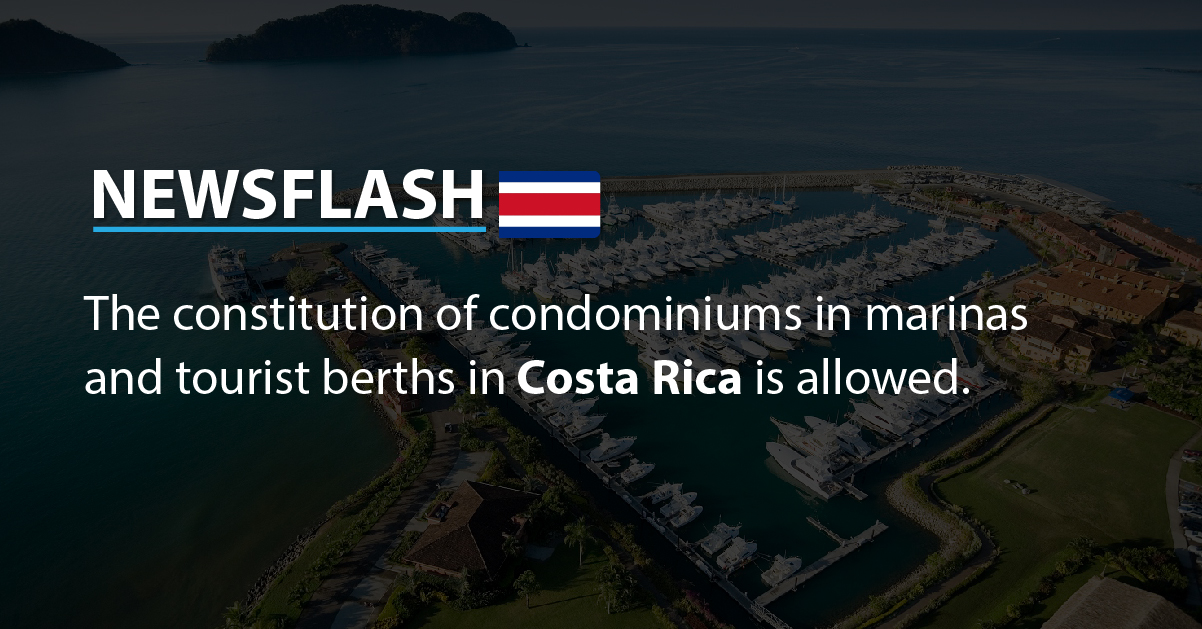On May 23, 2022, Executive Decree No. N°43511 MIVAH-MEIC-TUR, was published in La Gaceta, reforming the Condominium Property Regulatory Law Regulations (Executive Decree N°32303 MIVAH-MEIC-TUR of March 2, 2005), to enable the application thereof for marinas and tourist berths. Among the main aspects of this reform, are the following:
- Affectation of the marina or tourist berth concession to the Condominium Property Regime. The holder of a tourist marina or tourist berth concession right, granted under the Concession and Operation of Marinas and Tourist Berths Law, Law N° 7744 of December 19, 1977 and the reforms thereto, may submit its right to the Condominium property regime, as long as the functional unity of the marina or tourist berth in question is guaranteed and is consistent with the official planning instrument or the special legal regime instrument that applies to it, or in the case of the Gulf of Papagayo Tourism Pole (Polo Turístico Golfo de Papagayo), in accordance with its master plan approved by the Costa Rican Tourism Board (ICT).
- Condominiums on land surfaces and in areas covered by water. The affectation to the condominium regime may be both with respect to the land surface, as well as the areas covered by water.
- Permitted uses. All the uses established in article 3 of the Condominium Property Regulating Law (Law N° 7933) shall apply: housing, commercial, tourism, among others.
- Prior authorizations. The concessionaire must obtain prior authorization from: (i) the Municipality that granted the concession; (ii) ICT and the (iii) Inter-institutional Commission on Marinas and Tourist Berths (CIMAT) – by signing the form established for the affectation to the condominium property regime-. In the case of State Patrimony that are subject to the regime of possession, State agricultural property, parceling or colonization of land in the name of the Institute of Rural Development (INDE), in addition, the approval of this institute will be required. In the case of concessions granted within the Gulf of Papagayo Tourism Pole, the concessionaire must obtain only the prior authorization of ICT’s Board of Directors.
- Subsidiary concession agreements. Each subsidiary concession must have a new concession agreement subject to registration before the Public Registry, which must be signed under the same terms and conditions as the original concession, except: a) for the term, which will be the period remaining for the expiration of the term that was originally granted; and b) those matters in which it is essential to adjust the text to make it consistent with the partition of the original concession. Each concessionaire of a subsidiary concession will be individually responsible for fulfilling the obligations of its subsidiary concession agreement and in the case of a breach, an ordinary administrative proceeding will be initiated to terminate the subsidiary concession.
- Assignments and encumbrances. The holders of subsidiary concessions may assign, transfer, or encumber them, with the prior authorization from CIMAT and the Municipality that granted the concession, or from ICT for the case of the Gulf of Papagayo Tourism Pole, and in accordance with the established in the internal regulations of the condominium that governs them.
- Performance Bond. The performance bond required by Law N° 7744, for the development of the project, must be proportionally distributed among all subsidiary concessions, in such a way that in the event of a breach by one or more of the subsidiary concessionaires, it serves as the sole maximum solidarity guarantee; all the above pursuant to the Law for the Promotion of Tourist Marinas and Coastal Development, N° 9977 of April 5, 2021.
- Expiration date. The granting of new subsidiary concessions and the extension of existing concessions must be carried out in such a way that all subsidiary concessions within the same condominium have the same expiration date. Each subsidiary concessionaire must file its extension request individually.
- Free Access Areas. They must be freely accessible to any visitor to the marina or tourist berth, the bathrooms and public health facilities, parking spaces, pedestrian walkways, boardwalks, and open squares, fuel, and lubricant supply areas, as well as the Government office.
- Common Areas of Restricted Access. The following will have restricted access: the concessionaire’s administrative office, breakwater works, dock facilities, vessel maintenance workshop areas, boat launching facilities, dry boat storage, fuel storage area, treatment plant area, and recycling center area.
All these areas must be included in the deed and constitution regulations of the condominium as common areas, common areas of restricted access or private areas of the condominium and if they are private, free access to them must be guaranteed, this aspect must be ensured by the Condominium’s Administration.
This new regulation is effective as of its publication date.



